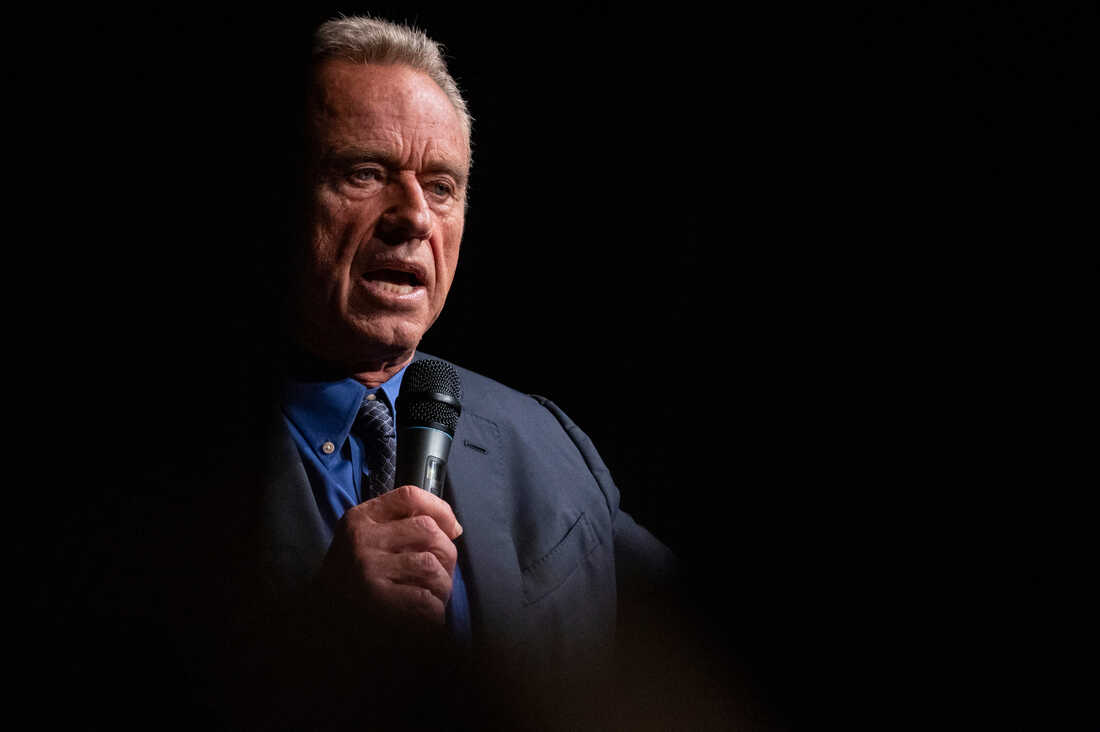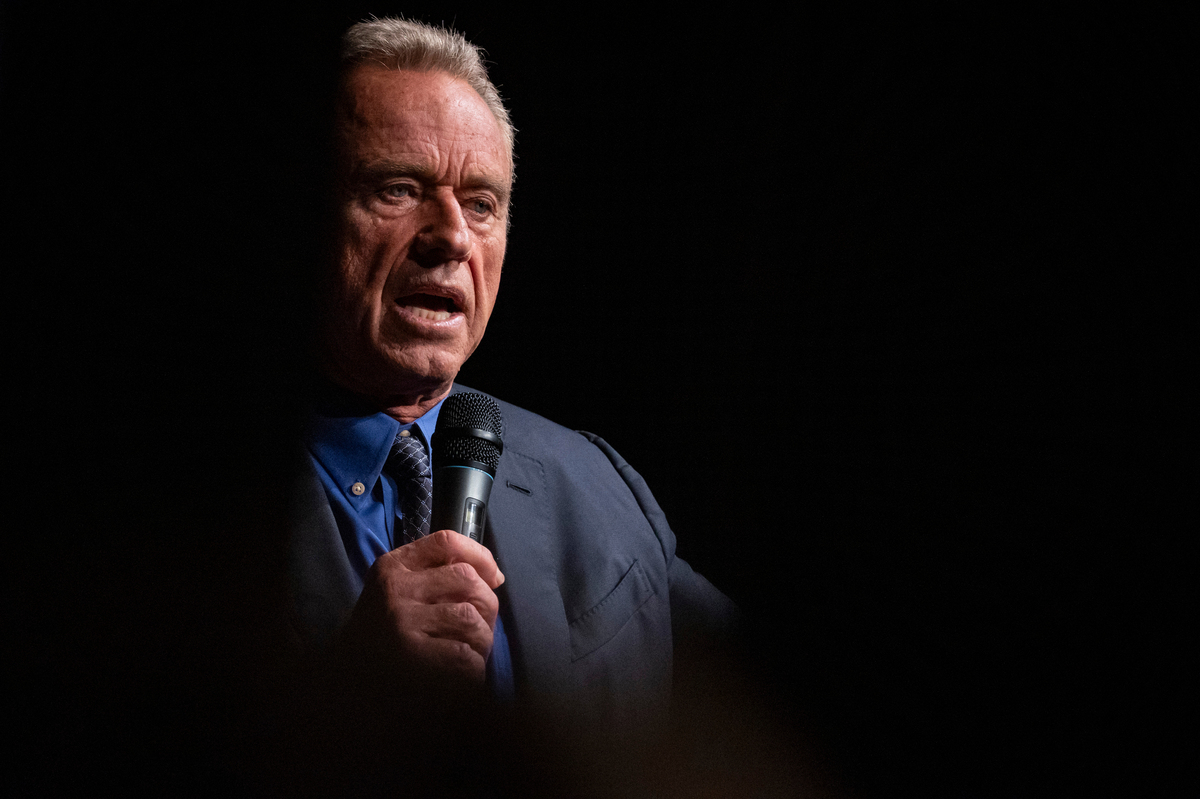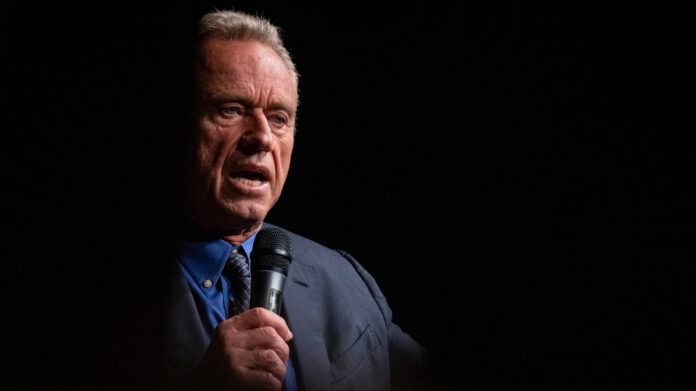
Robert F. Kennedy Jr., who is running as an independent presidential candidate, speaks during a campaign event in Miami Sunday.
Eva Marie Uzcategui/Getty Images
hide caption
toggle caption
Eva Marie Uzcategui/Getty Images

Robert F. Kennedy Jr., who is running as an independent presidential candidate, speaks during a campaign event in Miami Sunday.
Eva Marie Uzcategui/Getty Images
Robert F. Kennedy Jr., the political scion with the famous last name who’s running as an independent for president, is also infamous for his stances against vaccines.
Vaccines are safe and effective and have been credited with stopping the spread of diseases like measles, mumps and rubella, polio and global pandemics. Despite the solid evidence, people like RFK Jr. — with no expertise and who refuse to listen to experts — have spread disinformation about them, playing on false conspiracy theories.
He’s repeatedly falsely claimed that vaccines are not “safe and effective” and he even said, among other things, “I see somebody on a hiking trail carrying a little baby and I say to him, better not get them vaccinated.”
And yet, he claimed at a congressional hearing in July: “I have never been anti-vax. I have never told the public to avoid vaccination.”
That’s an obvious lie. But it might indicate Kennedy — who is the son of Robert F. Kennedy and the nephew of former President John F. Kennedy — knows that an anti-vaccine stance is not politically popular outside the segment that deeply, and falsely, disbelieves in their effectiveness.
Despite that, he’s made similar statements recently on the campaign trail before friendly crowds.
“I’m gonna say to NIH scientists, ‘God bless you all. Thank you for public service. We’re going to give infectious disease a break for about eight years,’ ” he pledged at an anti-vaccine conference in Georgia earlier this month.
He’s trying to capitalize on the sentiment that is widespread in some circles that buy into these false claims. He’s pairing that with his heterodox views on corporate and political power, which, combined, offers a message that has an appeal and a certain resonance with a not-insignificant number of people.
Despite – or perhaps because of these kinds of controversial stances – RFK Jr. has been coming back with some eye-popping polling results.
Surveys have shown him polling higher than any third-party candidate in 40 years.
As CNN’s Harry Enten notes, that 22% is the highest any independent candidate has polled since Ross Perot in 1992. Perot wound up with 19% of the vote, the highest of any third-party candidate since George Wallace’s 14% in 1968.
But Wallace is an example of how independent candidates’ numbers tend to fade.
- In one survey in 1968, Wallace hit 21%, but didn’t finish that high.
- Another independent candidate who made noise in 1980 was John Anderson. He was polling above 20%, but finished with just 7%.
There certainly appears to be room for third-party candidates. They likely wouldn’t pull enough support to win a presidential election, but political disaffection is high, voters are unhappy with their potential choices, they have negative views of both political parties, they don’t believe the political system is working well, and they have negative views of critical institutions.
When that’s the case, it creates a space for a potentially messy political brew. Name identification and money are key for candidates, and there’s hardly a less well-known last name in American politics than Kennedy.
But few in his own family think his run represents them or is a good idea.
“He’s trading in on Camelot, celebrity, conspiracy theories and conflict for personal gain and fame,” President Kennedy’s grandson Jack Schlossberg said of his cousin on Instagram in July. “I’ve listened to him. I know him. I have no idea why anyone thinks he should be president. What I do know is, his candidacy is an embarrassment.”
The opening for third-party spoilers is real
Surveys have been all over when it comes to who RFK Jr. pulls from more – President Biden or former President Trump. It’s still not entirely clear, but both parties are nervous.
There is undoubtedly the potential, if not the likelihood, for him to take a fairly sizable chunk of the electorate.
And he’s not the only third-party candidate who could be running. Academic Cornel West is running as an independent as well.
Jill Stein, whom many Democrats blame for costing Hillary Clinton key votes in key states in 2016, announced she’s once again pursuing the Green Party nomination again.
Sen. Joe Manchin, D-W.Va., who announced he’s not running for reelection to the U.S. Senate, said he’s “absolutely” considering his own presidential run. He’s promising to tour the country to see if there’s a “movement” for someone like him and has identified Super Tuesday, March 5, as a potential deadline for himself.
He told NBC News that he doesn’t like Trump and is “scared to death” he would become president again, but that Biden, someone he’s had a long relationship with, has “been pushed too far to the left.”
One avenue for Manchin to run could be with the group No Labels, which is in search of a candidate. It is vowing to get on the ballot in all 50 states for the general election.
All of these candidacies worry Democratic strategists. As it is President Biden is suffering from low approval ratings and lots of voters who simply think he’s too old to be president. And they threaten key parts of the Democratic base — West (Black voters), Stein (young progressives), Manchin (moderates), Kennedy (no one is sure exactly).
There’s certainly reason to be worried about this if you’re a Democrat. After all, in 2016, third-party candidates took home 7% of the vote, and Clinton lost.
In 2020, liberals galvanized in an effort to vote Trump out of office. That year, third-party votes made up less than 2% — and Biden won.
In both elections, Trump pulled in roughly 46% of the popular vote, and he has a fairly locked-in bloc of voters.
So Trump would likely need some third-party help, and with an increasing number of those potential candidates, it widens Trump’s path back to the White House.
A version of this story also appeared in the NPR Politics newsletter. Sign up for the newsletter here for early access and for more coverage of the biggest issues at play in 2024!





